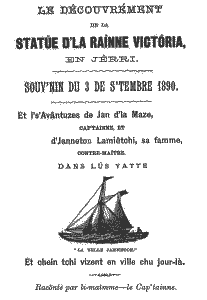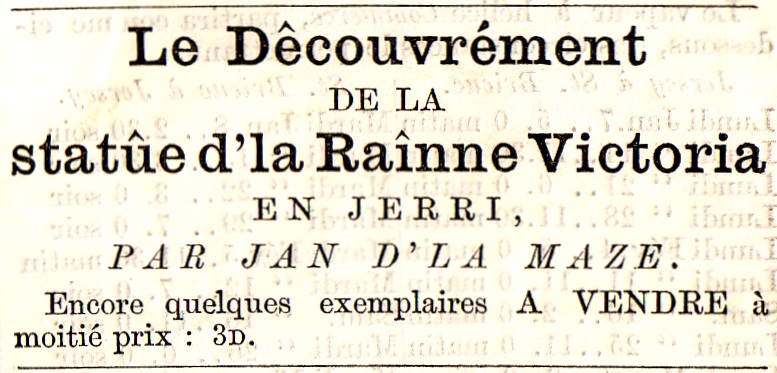

Not only are Jèrriais phrases sometimes used for "local colour" and alleged humour in some English texts - but the boot may on occasion be on the other foot.
Here are some examples of English phrases occurring in a Jèrriais text from the end of the C19th. The phrases are written in Jèrriais phonetic transcription for comic effect, and as will be seen the author even manages to get away with a surprisingly off-colour joke for the period.
The phrases are taken from a 60-page booklet entitled:

The Statue of Queen Victoria was unveiled on 3rd September 1890 and this story - completely in Jèrriais apart from these comic interjections - recounts the visit of Captain Jan d'la Maze (de la Mare) and his wife Jeanneton who decide to travel round the coast to St. Helier by sea in order to attend the unveiling. A newly-wed English-speaking couple, Mr. and Mrs. Fish, hitch a ride with the Captain and his wife back to Town. The language problems lead to misunderstandings from which humour derives. Transcriptions of English phrases also crop up in the second half of the story which is set in English-speaking St. Helier.
Here we present the English phrases, spelled as they appear in the text, with parallel transcription. Note also that the English used displays typical characteristics of the traditional Jersey dialect of English.
| English phrases in Jèrriais spelling | Transcription into English spelling |
| Redde, ouaîte ainne bloûe | Red, white and blue |
| Iz ite hiére Caiptunne Djanne dé lé Mère livze? | Is it here Captain John de la Mare lives? |
| Ouate fore dimaînde Caiptunne dé lé Mère, aîe? Ioû ouantce hime, aîe? | What for demand Captain de la Mare, eh? You wants him, eh? |
| Penne de dore, Caiptunne | Open the door, Captain |
| Ioû nôze mi, Caiptunne | You knows me, Captain |
| honi-moûne | honeymoon |
| Diére Caiptunne saie yesse! | Dear Captain say yes! |
| Goude naïte, Caiptunne, goude naïte, Maidumme | Good night, Captain, good night, Madam |
| Gô-qouique, mi câle ioû ètte fore tou-mârro mârlin'gue! | Go quick, me call you at four tomorrow morning! |
| Camme ânne, camme ânne, eupe qouique, ioû ainne de micice; baïne-baïe fôre! | Come on, come on, up quick, you and the missus; by in by four! |
| Bi âffe ioû tîfe, ore mi lèt gô | Be off you thief, or me let go |
| Guette ope, guette ope Mistré Fiche! | Get up, get up Mister Fish! |
| O dèrke ite îze, maï leuve! | How dark it is, my love! |
| Névre maïne, ouîe meuste gô, ioû nô, Fredde | Never mind, we must go, you know, Fred |
| Iz ette ioû, Caiptunne dé lé Mère | Is that you, Captain de la Mare |
| Aïe caînte sîe natin'gue | I can't see nothing |
| Têke maï érme, micice | Take my arm Missus |
| Aoûe naïce, caiptunne | How nice, Captain |
| Louque, Fredde, aoûe pretti; louque, louque! | Look, Fred, how pretty; look, look! |
| Mémèe, aï ouantce tou gô tou maï mémèe! Fredde, têke mi tou maï mémèe! | Mummy, I wants to go to my mummy! Fred, take me to my mummy! |
| Louque aoûte, ioû faredde! Lèt gô de djibbe-shîte, lèt gô de djibbe-shîte. | Look out, you forward! Let go the jib-sheet, let go the jib-sheet |
| Lèt gô de djibbe-shîte, lèt gô de frannete sêle rôpe | Let go the jib-sheet, let go the front sail rope |
| Drâ de djibbe-shîte tâte, Mistré Fiche | Draw the jib-sheet tight, Mister Fish |
| Lèt gô, ioû foûle, lèt gô | Let go, you fool, let go |
| Ioû lainnede-sheurke, di odeur, poule di odeur, poule di odeur djibbe-shîte! | You land-shark, the other, pull the other, pull the other jib-sheet! |
| For shême, ôlde mainne, ouate fore saie shîte sô motche é-bôrde é bôte? | For shame, old man, what for say "shit" so much aboard a boat? |
| Maïne yeûre siquenesse, mèdemme; maïne yeurselfe. | Mind your sickness, madam; mind yourself |
| Erre ioû slîpinne, Mistré Fiche? | Are you sleeping, Mister Fish? |
| Ouêre îze ette aïe aimme? natte ine maï bedde shôrelé | Where is it I am? not in my bed surely |
| Nô èrme done, mèdemme, kaitch't é faïne fiche fore ioû - dère î îze | No harm done, madam, catched a fine fish for you - there he is |
| Gô tou bedde, maï dièrzes - dètce de plêce fore ioû! | Go to bed, my dears - that's the place for you! |
| Lîve dice afficeur' ainne îze lêdi pèsse! | Leave this officer and his lady pass! |
| Taincke ioû, brodeur | Thank you, brother |
| Yôre Excellance, doû euce di honeur tou annevêle di Stètioû! | Your Excellence, do us the honour to unveil the Statue! |
| Gâde Sêve de Kouîne! | God Save the Queen! |
| Goude mârlingue, mistré Police Officeur, aoûre ioû? faîne oueddeur tou-daîe, aîe? | Good morning, mister Police Officer, how are you? fine weather today, eh? |
| Ize ette ioû, Caiptunne? Come ine, dé-ve bîne aissekinne fore ioû ainne yeûr micice toû-r'trie taïme - come ine. | Is that you, Captain? Come in, they've been asking for you and your missus two or three time - come in |
| Mi natte onedressetainne ouate ioû saîe, Micice. | Me not understand what you say, Missus. |
| Nô, caiptunne, yeûre loukce îze eneufe fore mi! | No, captain, your looks is enough for me! |
| Pîpulze-Pèrque | People's Park |
| Gô ite ôlde oumunne, gô ite, ioû ouine dé raîce, ioû'le ève dé kope | Go eat old woman, go eat, you win the race, you'll have the cup |
| aû-di-doux | how-d'ye-do |
| faïeur-oueurx | fireworks |

See also: